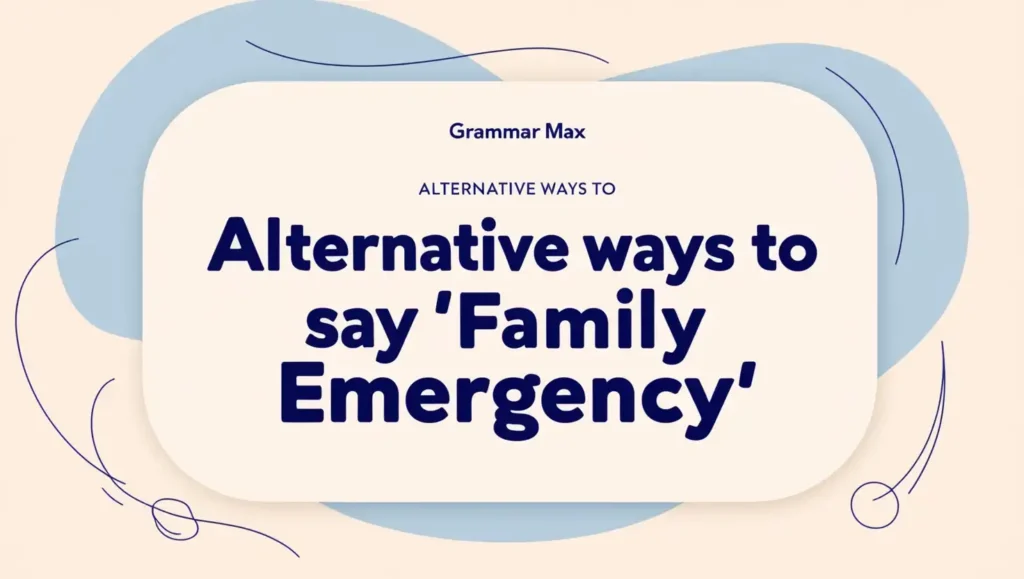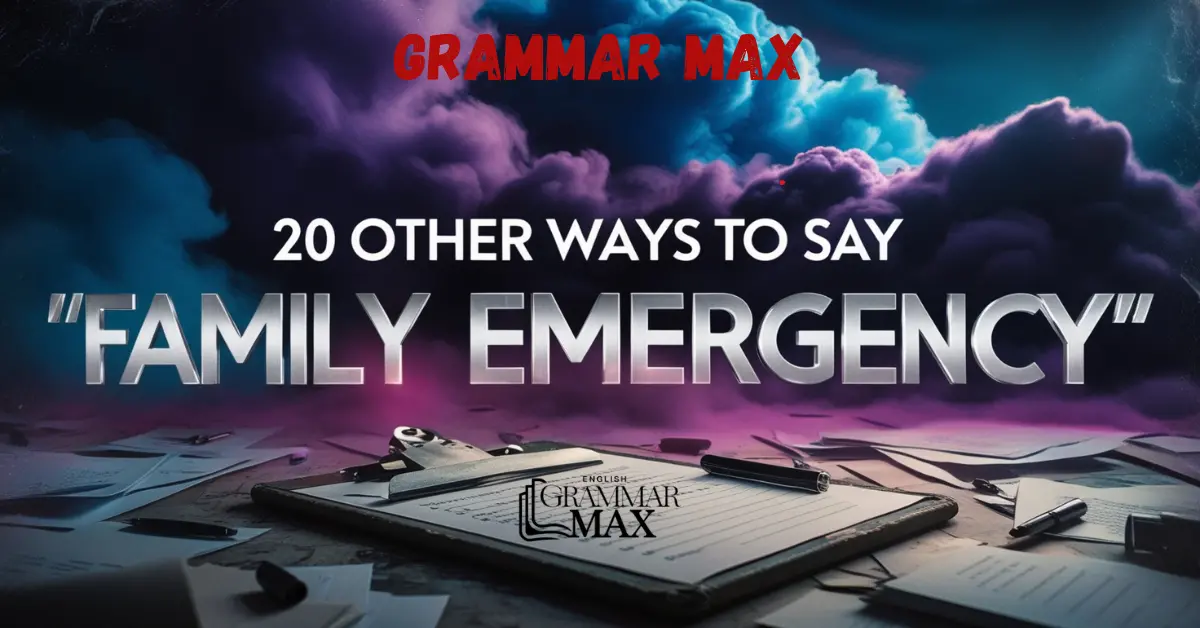Life can sometimes throw unexpected challenges our way, especially when it comes to our families. When those moments arise, we often need to communicate the situation with sensitivity and professionalism. Finding the right words to express a family emergency is crucial, especially in formal settings. Whether you’re sending an email to your boss or informing a colleague, knowing alternative ways to describe these situations can help maintain your professionalism while showing respect for your loved ones’ privacy.
Here, we’ll explore 20 alternative ways to say “family emergency,” along with their best use cases and examples.
Alternative Ways to Say “Family Emergency”

Here are 20 alternative ways to say family emergency:
- Family Crisis
- Urgent Family Obligation
- Family Situation
- Family Matter
- Family Issue
- Family Health Concern
- Medical Emergency
- Private Family Matter
- Unforeseen Family Crisis
- Family Medical Situation
- Serious Family Issue
- Family Member in Distress
- Grieving a Loss
- Personal Circumstances
- Sensitive Family Issue
- Pressing Family Matter
- Immediate Family Concern
- Unexpected Family Obligation
- Critical Family Matter
- Family Emergency Situation
1. Family Crisis
When a situation at home escalates into a serious problem, referring to it as a family crisis can capture the gravity of the situation. This is one of the most direct family emergency synonyms and is appropriate for urgent scenarios where quick action is required.
Best Use: This phrase works well in emails to supervisors or colleagues when you need to excuse yourself for an unspecified, urgent matter.
Example: “Dear Mr. Collins,
I regret to inform you that I am facing a family crisis that requires my immediate attention. I will keep you updated on my availability. Thank you for your understanding.
Best regards,
Sarah”
2. Urgent Family Obligation
This expression emphasizes the urgency while maintaining a degree of formality. It’s ideal for situations where you want to communicate the seriousness of the matter without providing explicit details.
Best Use: Use this in formal or semi-formal emails when you need to step away temporarily but don’t want to elaborate on the situation.
Example: “Hi Jonathan,
I’m afraid I need to leave early today due to an urgent family obligation. I will make sure to catch up on any missed work. Thank you for your understanding.
Best,
Lucy”
3. Family Situation
When the problem isn’t necessarily life-threatening but still requires your attention, describing it as a family situation can soften the severity while still implying its importance.
Best Use: Suitable for less critical emergencies or when the exact nature of the emergency doesn’t need to be shared.
Example: “Dear Ms. Sanchez,
Unfortunately, I am dealing with a family situation that requires my immediate attention. I will need to take the rest of the day off. Please let me know if you need further details.
Regards,
David”
4. Family Matter
Family matter is a subtle way of explaining an absence. It’s broad, but its formality can fit various contexts, from business settings to casual conversations.
Best Use: Ideal for situations where you don’t want to disclose much about the nature of the emergency but still want to maintain a professional tone.
Example: “Hi Karen,
I am sorry, but I need to handle a family matter that just came up. I will try to be back in the office tomorrow. Thank you for your patience.
Best,
Tom”
5. Family Issue
This is a more neutral alternative to “emergency.” It conveys that something is wrong without suggesting that it’s a life-or-death situation.
Best Use: Use this phrase when the situation is significant but not catastrophic.
Example: “Dear Robert,
I’m currently dealing with a family issue and will be unavailable for the rest of the afternoon. Please feel free to reach me on my mobile if something urgent comes up.
Kind regards,
Jessica”
6. Family Health Concern
A family health concern suggests that a family member’s well-being is at stake. It is suitable for situations involving medical concerns but doesn’t reveal too much about the exact nature of the problem.
Best Use: This expression is ideal when the situation revolves around a family medical situation that requires your immediate attention.
Example: “Hello Dr. Matthews,
I will not be able to attend the meeting tomorrow due to a family health concern. I hope to reschedule later this week.
Thank you for your understanding,
Ben”
7. Medical Emergency
When a family member faces a sudden illness or injury, referring to it as a medical emergency directly communicates the seriousness of the situation.
Best Use: Best used for situations involving urgent health needs or requiring emergency care.
Example: “Dear Ms. Stone,
I regret to inform you that I must leave immediately due to a medical emergency involving a family member. I will update you as soon as I can.
Regards,
Anna”
8. Private Family Matter
A private family matter suggests a sensitive or personal situation that doesn’t need to be disclosed to others. This phrase allows you to maintain privacy while still communicating the importance of the situation.
Best Use: Use this when discretion is necessary, and you want to avoid further inquiries.
Example: “Dear Mr. Evans,
I need to step out today due to a private family matter. I will check in later this evening to catch up on missed work.
Thank you,
Monica”
9. Unforeseen Family Crisis
An unforeseen family crisis suggests an event that was unexpected and requires immediate attention. It conveys a sense of urgency while still being respectful.
Best Use: Ideal for situations where the crisis is unexpected and disruptive.
Example: “Dear Professor Johnson,
Unfortunately, I am dealing with an unforeseen family crisis and won’t be able to attend class today. Please let me know if there is anything I can do to make up for the missed lecture.
Best regards,
Mark”
10. Family Medical Situation
When someone in your family is dealing with a health issue that requires attention, calling it a family medical situation can communicate urgency without going into unnecessary details.
Best Use: This phrase is particularly useful for family-related health emergencies requiring a degree of discretion.
Example: “Hi Josh,
I’m afraid I will be out for the remainder of the day due to a family medical situation. Please let me know if I need to reschedule any meetings.
Thanks,
Leah”

11. Serious Family Issue
A serious family issue indicates that the problem is significant but not necessarily life-threatening. It is one of the more formal family emergency synonyms.
Best Use: Best used in professional contexts where the severity of the problem needs to be acknowledged.
Example: “Hi John,
I am dealing with a serious family issue that will prevent me from attending the meeting this afternoon. I will follow up with you later.
Best,
James”
12. Family Member in Distress
This phrase is often used when a close family member is experiencing emotional or physical difficulties, requiring your immediate attention.
Best Use: Suitable when you need to offer family support to someone in distress.
Example: “Hi Emma,
I need to step out today as a family member is in distress. I will be available by phone if needed, but my attention will be divided.
Thank you for your understanding,
Aaron”
13. Grieving a Loss
When a death occurs in the family, the phrase grieving a loss is more sensitive than simply saying “family emergency.” It expresses the emotional weight of the situation.
Best Use: Best used for notifying others when dealing with the death of a loved one.
Example: “Dear Mr. Lewis,
I wanted to inform you that I am grieving a loss in my family and will need a few days off to handle the arrangements. I appreciate your support during this difficult time.
Best,
Claire”
14. Personal Circumstances
This is a broad and neutral phrase, suitable for situations where you wish to keep things vague while still conveying that there’s an issue that demands attention.
Best Use: This phrase works best in formal communication where you don’t wish to elaborate.
Example: “Hi Susan,
Unfortunately, I am dealing with some personal circumstances and won’t be able to attend the meeting this afternoon. I will catch up with you later.
Best,
Matt”
15. Sensitive Family Issue
A sensitive family issue implies a situation that involves private matters. This phrase works well for personal crises that require discretion.
Best Use: Use this phrase when the issue involves delicate family matters that may not be appropriate to share with others.
Example: “Dear Ms. Harris,
I am currently dealing with a sensitive family issue that needs my immediate attention. I will inform you when I am available again.
Kind regards,
Michael”
16. Pressing Family Matter
A pressing family matter suggests that the issue is urgent and requires immediate attention, though it doesn’t necessarily imply a crisis. It’s appropriate when you need to excuse yourself for an important family obligation.
Best Use: This phrase works well for both formal and semi-formal situations, especially when you need to communicate the urgency without elaborating.
Example: “Hi Jeff,
I need to leave early today due to a pressing family matter. I will make sure to catch up on any pending tasks tomorrow. Thank you for understanding.
Best,
Emily”
17. Immediate Family Concern
An immediate family concern emphasizes that the issue involves close family members and requires your prompt attention. This phrase is respectful and implies a serious situation.
Best Use: Ideal for work emails or messages where you need to explain your absence due to a family-related concern.
Example: “Dear Mrs. Bradley,
Unfortunately, I am dealing with an immediate family concern that requires my attention. I will update you on my availability as soon as possible.
Best regards,
Nathan”
18. Unexpected Family Obligation
This phrase conveys that the obligation was unplanned and urgent. It works well for sudden family duties that arise unexpectedly, such as helping a family member in need or managing an unforeseen family situation.
Best Use: Perfect for professional settings where you need to communicate that the situation came up without warning.
Example: “Hi Maria,
I regret to inform you that I have an unexpected family obligation today and will not be able to attend our meeting. I will reschedule as soon as I can.
Best,
Ryan”
19. Critical Family Matter
A critical family matter conveys urgency and seriousness. This phrase is appropriate for situations where the family issue is not just important but potentially disruptive to your usual schedule.
Best Use: Use this in more formal settings when you need to excuse yourself for a serious issue affecting your family.
Example: “Dear Mr. Anderson,
I am facing a critical family matter and will need to step away for the day. I will check in as soon as I am able.
Thank you for your understanding,
Rebecca”
20. Family Emergency Situation
A family emergency situation directly communicates that something serious and urgent is happening within the family. It’s straightforward and appropriate for more formal announcements of an urgent situation.
Best Use: Ideal for situations where clarity is essential, and the urgency of the situation needs to be conveyed directly.
Example: “Hi Jessica,
I need to inform you that I’m dealing with a family emergency situation and will be out of the office for the rest of the day. I will keep you updated as I know more.
Best regards,
Chris”
When to Use These Phrases?
Use these phrases when you need to communicate a family emergency or urgent family obligation professionally. Whether you’re addressing a family health concern, critical family matter, or a private family issue, these variations allow you to express the seriousness of the situation while maintaining discretion and professionalism, ensuring your message is clear without oversharing details.
Is it Professional to Say “Family Emergency”

Using the phrase “family emergency” can be professional in certain contexts, especially when immediate action is needed. However, it’s often better to use more specific alternatives depending on the situation. Phrases like “urgent family obligation” or “private family matter” maintain professionalism while respecting privacy. Overusing “family emergency” may appear vague or raise unnecessary questions, so opting for variations like “family health concern“ or “serious family issue” can help convey the seriousness more precisely. Tailoring your language ensures you communicate effectively without compromising professionalism.
Frequently Asked Question
What can I say instead of family emergency?
Instead of family emergency, you can say urgent family obligation, family health concern, or private family matter. These alternatives maintain professionalism and offer more discretion.
What qualifies as a family emergency?
A family emergency includes situations like a medical crisis, accidents, death in the family, or unforeseen health issues that require immediate attention.
How do you say you’re having a family emergency?
You can say, “I’m facing a family health concern and need to step away immediately,” or “I’m dealing with a serious family issue and need some time.”
How do I tell my boss I have a family emergency?
To tell your boss, say, “I’m facing a family emergency and need to leave immediately. I’ll update you as soon as possible.”
Conclusion
In summary, effectively communicating a family emergency is essential in maintaining professionalism while addressing urgent personal matters. By utilizing alternative phrases like urgent family obligation, private family matter, or critical family issue, you can convey the seriousness of the situation without compromising your loved ones’ privacy. Tailoring your language to fit the context allows you to express urgency while ensuring clarity. Ultimately, the right words can help navigate these challenging moments with grace and respect, allowing you to focus on your family’s needs while maintaining your professional responsibilities.

William Henry is a writer for Grammar Max, a blog that focuses on synonyms and phrases. He loves exploring the quirks of the English language and enjoys helping readers improve their vocabulary. William’s articles are easy to read, fun, and full of useful tips for anyone looking to better understand and use English. Whether you’re a student, a professional, or just someone interested in language, William’s writing on Grammar Max makes learning about words and their meanings simple and enjoyable.
